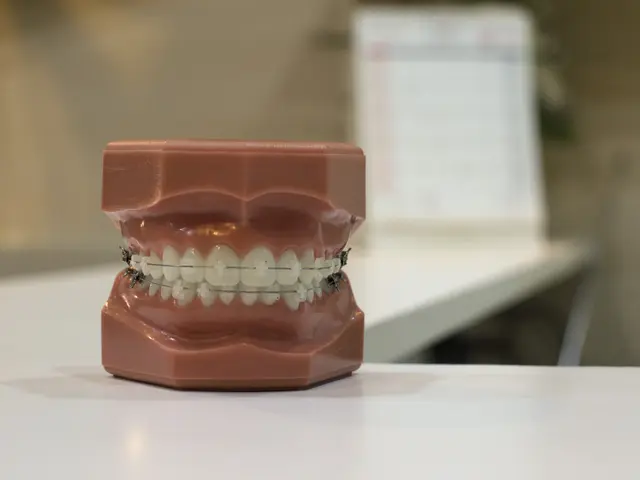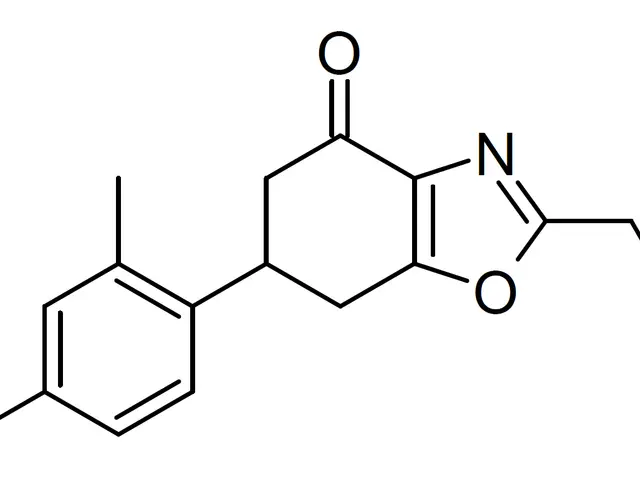Could neuropeptides potentially serve as effective alternative topical treatments, resembling 'Botox in a bottle' and delivering desirable results?
In the UK, Botox continues to reign as a top aesthetic treatment, with an estimated 900,000 injections administered annually. Yet, people are increasingly seeking natural, less invasive alternatives, and skincare is stepping up to the plate. One such ingredient gaining popularity is neuropeptide Myoxinol. With a 37% increase in global searches between December 2024 and February 2025, Myoxinol is being hailed as the new kid on the block, challenging Botox as the go-to anti-aging solution.
Cosmetic doctor Dr. Emmaline Ashley explains, "Myoxinol fits into a broader trend of using neuropeptides in skincare, which aim to regulate nerve signaling or muscle activity in a subtle topical manner, without any needles or injectables." Other popular neuropeptides like argireline and syn-ake are also garnering attention for their 'relaxing' effects on facial muscles. These peptides appeal to those seeking a softer approach to anti-aging.
Myoxinol is a botanical peptide derived from the hibiscus plant (Hibiscus esculentus). Its workings are simple yet impactful: it inhibits facial muscle contractions, much like Botox, yet without the use of injectable neuromodulators. Dr. Ashley expounds, "This inhibition leads to a softening of dynamic lines, such as crow's feet or frown lines, over time. Moreover, Myoxinol boasts antioxidant properties that help reduce and prevent oxidative stress caused by environmental aggressors like air pollution."
Is Myoxinol a Real Botox Alternative?
When claims equate topical ingredients with injectable treatments, as with Myoxinol, it's essential to approach them with caution. Dr. Sonia Khorana, a cosmetic doctor and dermatology expert, states, "Myoxinol is not a replacement for injectable neurotoxins. It won't provide the same dramatic, long-lasting effects as Botox."
Botulinum toxin works by halting the release of the neurotransmitter acetylcholine (ACh), thereby cutting communication between nerves and muscles. Topical skincare isn't capable of achieving this. Dr. Ashley adds that while trials have shown promising results, these data are preliminary and not yet backed by large, robust clinical trials.
Our experts concur that neuropeptides like Myoxinol can serve as a fantastic addition to at-home skincare routines, enhancing the effects of Botox treatments when used together. They can also be valuable for those seeking to extend the results of their injectable treatments or for individuals hesitant about needles.
Who Should - and Shouldn't - Use Myoxinol?
Myoxinol can be utilized as a preventative measure or for more mature skin, either alone or in conjunction with injectables. If you're intrigued by science-backed, smart skincare or apprehensive about injectables, Myoxinol might be the perfect fit.
Experts agree that this is generally a well-tolerated ingredient for most. However, those with known allergies to botanical extracts, particularly hibiscus, should exercise caution. Furthermore, due to the limited modern clinical data, Myoxinol should not be recommended as a substitute for proven clinical treatments for individuals with more established or deeper lines.
Neuropeptide Skincare Products to Try
Irene Forte's Hibiscus Night Cream (£165 for 50ml) is one of the most well-known modern formulations containing Myoxinol. Backed by over 40 years of research and the expertise of Dr. Francesca Ferri, this cream performed exceptionally well in clinical trials and contains a blend of green pea polypeptides, hyaluronic acid, and ceramides, along with its star ingredient, to hydrate, smooth, and lift the skin.
For more affordable options, The Ordinary's Argireline Solution 10% (under £10) directs its attention to expression lines, making it a fantastic budget-friendly complement to pricier in-clinic treatments. Murad's Myoxinol Corrector (£79 for 15ml) allows targeted application to areas of concern, such as the forehead, brow lines, and facial lines around the nose and mouth.
In summary, Myoxinol's popularity stems from its ability to mimic the age-defying effects of Botox, all while remaining a topical, non-invasive treatment. Though not a substitute for Botox, Myoxinol can serve as a valuable adjunct to injectable treatments or a preventative measure for those seeking a gentler approach to anti-aging.
- Myoxinol, a topical skincare ingredient, is gaining popularity as it offers a natural, less invasive alternative to Botox, with neuropeptides aiming to regulate nerve signaling or muscle activity in a subtle topical manner.
- Myoxinol, a botanical peptide derived from the hibiscus plant, inhibits facial muscle contractions like Botox, reducing dynamic lines over time, and also possesses antioxidant properties.
- While Myoxinol is not a replacement for injectable neurotoxins, it can serve as a fantastic addition to at-home skincare routines, enhancing the effects of Botox treatments when used together, or acting as a preventative measure for more mature skin.
- Myoxinol can be utilized by individuals who are intrigued by science-backed, smart skincare or apprehensive about injectables, but those with known allergies to botanical extracts, particularly hibiscus, should exercise caution.








